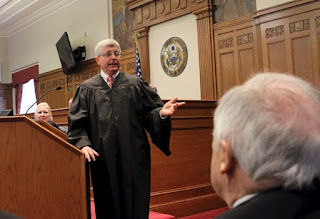In the case of Fertig v. Kelley, No. 16-CV-4801 (C.P. Lacka. Co. Nov. 5, 2020 Nealon, J.), Judge Terrence R. Nealon of the Lackawanna County Court of Common Pleas granted a UIM carrier’s Motion for Summary Judgment with regards to a statutory bad faith claim in a UIM case.
According to the Opinion, following a motor vehicle accident, the Plaintiff filed a post-Koken action against both the third party tortfeasor driver and the Plaintiff's own underinsured motorist carrier. The Plaintiff also asserted a bad faith claim against the UIM carrier pursuant to 42 Pa. C.S.A. §8371.
The claim against the third party defendant was settled and, thereafter, the remaining claims against the UIM carrier continued.
In support of a bad faith claim, the Plaintiff asserted that the UIM carrier had a duty to pay UIM benefits “that were reasonably due,” but “failed to promptly offer payment of the reasonable and fair failure” of her claim.
The court noted that the record before it confirmed that the UIM carrier had promptly addressed and resolved an issue regarding the timing of the named insured’s execution of her limited tort coverage election form, and had also reformed the insurance policy to afford full tort coverage to the Plaintiff in light of the same.
It was additionally noted that, once the Plaintiff presented a settlement demand for UIM benefits fourteen (14) months after the UIM carrier had granted the Plaintiff full tort status, the UIM carrier denied the Plaintiff’s claim on the grounds that the tortfeasor’s liability insurance coverage of $100,000.00 was sufficient to compensate the Plaintiff for her alleged injuries.
After the Plaintiff later settled her liability claim against the tortfeasor for only $57,500.00 out of the available $100,000 in liability limits, the UIM carrier eventually filed a Motion for Partial Summary Judgment with regards to the Plaintiff’s statutory bad faith claim. I note that I was the defense attorney for the third part tortfeasor in this matter.
Judge Nealon noted that, in order to recover damages for bad faith under 42 Pa. C.S.A. §8371, the Plaintiff must demonstrate, by clear and convincing evidence, that the UIM carrier (1) did not have a reasonable basis for denying the request for UIM benefits, and (2) knew or recklessly disregarded its lack of a reasonable basis to deny the UIM claim.
The court noted that, even viewing the record in a light most favorable to the Plaintiff as required by the standard of review for a summary judgment motion, the court found that the record did not contain sufficient evidence to support a claim that the UIM carrier lacked a reasonable basis for declining to pay UIM benefits to the Plaintiff and/or that it knew or recklessly disregarded any alleged lack of reasonable basis for denying the request for UIM benefits.
Judge Nealon noted that “[a] dispute between an insurer and a claimant regarding the value of a UIM claim is not uncommon, and, standing alone, does not create a triable issue of fact as to the insured’s bad faith.”
The court found that the facts before the court not only supported an objective conclusion that a reasonable carrier would have denied the Plaintiff’s UIM claim on the basis that her damages did to exceed $100,000.00, as evidence, in part, by the Plaintiff’s voluntary tort settlement of only $57,500.00 of the available $100,000.00 liability limits, but that the record was also devoid of any evidence that the UIM carrier knew or recklessly disregarded its alleged lack of a reasonable basis for denying the Plaintiff’s claim for benefits.
As such, while the court ruled that the Plaintiff may still pursue a claim for UIM benefits, subject to a credit owed for the tortfeasor’s liability coverage limit of $100,000.00, the court was granting the UIM carrier’s Motion for Partial Summary Judgment relative to the Plaintiff’s bad faith claim.
Anyone wishing to review a copy of this decision may click this
LINK.
















